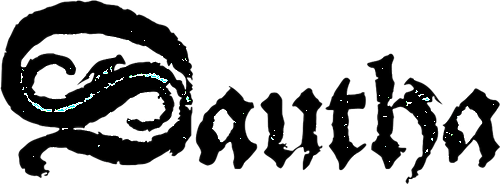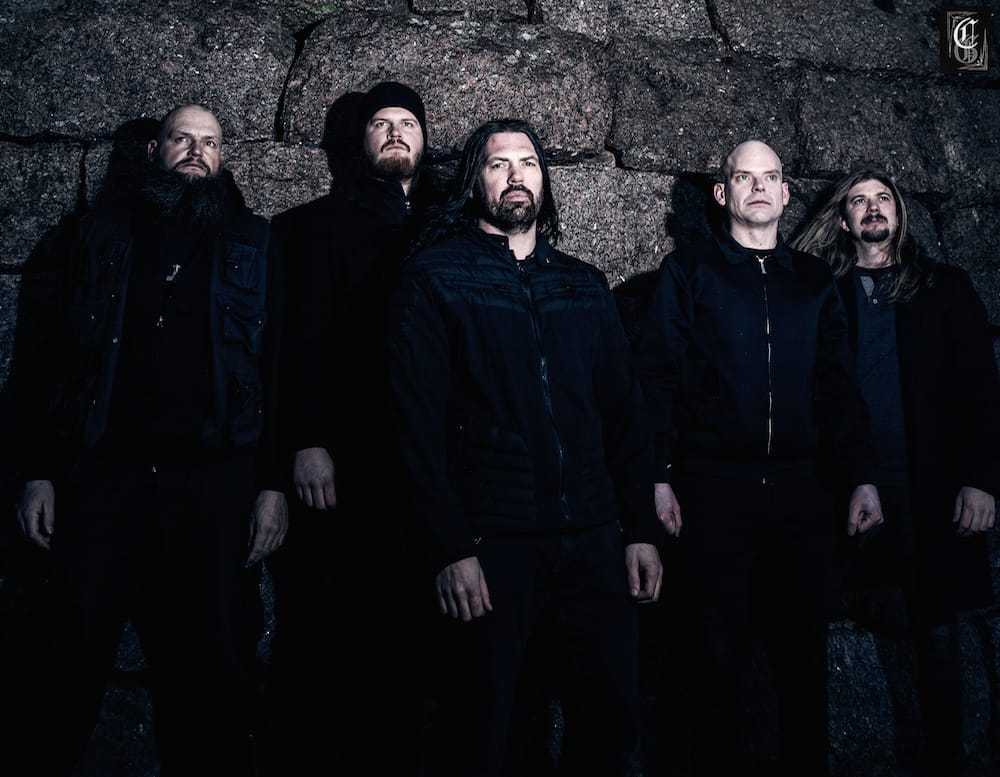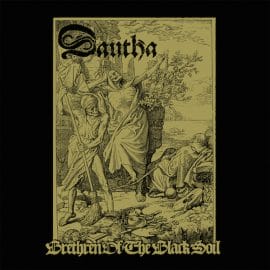There’s a good reason for the middle ages to also be called „the dark age“ – therefor besides the music from that era, doom metal seems to be to most fitting way to musically tell the stories of that time. DAUTHA recently proved that claim to be true with their debut „Brethren Of The Black Soil“. While talking to Ola Blomkvist, we asked the band founder and guitarist about the songs‘ content, his fascination for times long gone and his further plans for the still young project of his.

DAUTHA is still a rather young band, you play medieval doom metal. Which one of you was the initiator that started the band and how did it come to your cooperation?
I started the band in 2013 as a side project to Griftegård and Wardenclyffe, and after six months I asked my drumming college in Wardenclyffe, Micael Zetterberg, to join me. After a year of rehearsing as a duo we invited Emil Åström, the bass player of Wardenclyffe, to come along and soon Erik Öquist was incorporated on lead guitar. Then, in the beginning of 2016, Lars Palmqvist agreed to become our singer. Both Erik and Lars are colleges of mine from work, and knowing their capacity as musicians, and as human beings, I knew they’d fit well into the body of DAUTHA.
Do you craft your songs all together or do you have a primary songwriter in the band?
I am the primary songwriter, but everyone in the band contributes, making DAUTHA a team work effort all the way.
All of you are also involved in other bands as well. Compared to them, where does DAUTHA rank in terms of importance? Is it rather meant as a loose side project or do you intend to focus on and continue with the band for a longer time?
Speaking for myself, and, at least I’d like to think, Erik, Micael and Emil, I would state that DAUTHA is our main priority. Lars, on the other hand, is the only one in the band that has something that can be called a musical career and this has not happened through DAUTHA, obviously, but through Scar Symmetry, which would be his number one musical engagement. Also, recently Lars got contracted to a rock musical in England called Krankenstein (http://www.krankensteinshow.com/) and this is something we also have to consider when planning for DAUTHA. We definitely intend to keep the band going and plans and material for a second album already exists.
Where do you get most of your inspiration for music from? I suppose bands like Candlemass have a big influence on you, right?
Well, there is no way to avoid getting influenced by Candlemass, at least to a certain degree, when playing Epic Doom. However, for DAUTHA Folk, Neofolk and medieval music is just as important, or even more important, when it comes to influences, even though it may not be blatantly audible in our sound.
Your usage of medieval instruments and elements is quite nuanced while other bands focus almost entirely on them. Do you also appreciate that or is it rather mandatory for you to still have a focus on metal?
Usually when metal bands incorporate traditional instruments, like in Folk Metal, it becomes too happy clappy for us. We want to maintain the weight of Doom Metal while tapping into the melancholy side of folk.
You recently released your debut „Brethren Of The Black Soil“ – two years after your first demo. What was going on with you in the meantime?
We composed and rehearsed for the recording of the debut and I wrote all its lyrics.
The track „In Between Two Floods“ was already heard back then and now it is also on the record. Why did you once more use this particular song instead of the other two?
We felt it was the one that best suited the over all feeling we wanted to achieve with the album.
You released a music video for the album’s opener „Hodie Mihi, Cras Tibi“. Why did you choose exactly this track for that?
It was the song that best summarized what the album is about, being both melancholic, epic, dark, heavy and frail. Also, we had an idea for the video that was possible to realize, given our non existing budget and complete lack of video filming skills.
Which song on the record would you deem your personal favorite and why?
It is hard to chose between ones children… but if I have to, it would be the title track, because the narrative of it marries so well to the music. Also, I believe the vocal melody for the refrain is reasonably memorable and definitely the best our singer Lars Palmqvist has ever come up with. In addition I am quite happy with how we made, and incorporated, a psalm out of an old poem by German poet Andreas Gryphius into the song.
You mostly use slow tempos in your songs and you often repeat their main melodies. Especially the title track is quite long because of that. Why is repetition such an omnipresent element in your music?
When composing for DAUTHA feeling and atmosphere are our guiding lights, along with consideration of the lyrical narrative, and if this leads to someone thinking we repeat ourselves or make too long songs then so be it. Most people who have written to us about the album point out how varied and multi-layered they think it is though, so I guess all lies in the ears of the listener.
The album also features some guest musicianship like for example the cello. Did you already know that you would get some help in the studio when you wrote the songs or was this just coincidental because you already knew them personally or something like that?
The cello is a violin actually, or rather, it is two violins, one being an alto. All the violin melodies was written on keyboard by Lars before we entered the studio, save for one melody in „Bogbodies“, which our mercenary-violinist Åsa Eriksson Wärnberg came up with on spot while recording. The majority of the choirs and background vocals were also composed by Lars prior to us entering the studio, however, there were slight changes made to them in certain places by our guest vocalists Rikard Larsson and Kristian Karlsson. Rikard and Kristian also added choirs and background vocals on their own initiative and with our consent.
In your lyrics you deal with lots of different historical topic from ancient and medieval times. What exactly fascinates you about these subjects?
 Beginning with „Hodie Mihi Cras Tibi“, it is a song that moves in the same waters as the memento mori/vanitas funerary art popular during medieval post-plague times. I believe this art style to be unsurpassed still to this day in terms of morbid beauty when it comes to portraying our inevitable decline, and this is our little stab at it. „Brethren Of The Black Soil“ then, is our way of lending a voice to history’s small and trampled while redeeming them through death’s equalizing power over both rich and poor. I think it is important to acknowledge the trials and hardships of our hard laboring ancestors. As for „Maximinus Thrax“, he was the first of the Roman soldier emperors and the really interesting thing about Maximinus is that he was of very simple stock, merely a Thracian farm boy which rose to become ruler of the “civilized“ world. Also, he probably suffered from acromegaly, making him a giant of a man that according to contemporary sources stood in excess of 2.5 meters tall, with muscles and temper to match. In addition he had a fierce temper while being really smart. So, in essence, he is, literally, a larger-than-life character that probably would be too much even for the most bombastic Hollywood movie-script. As for „The Children’s Crusade“, its appeal lies in the grand scale tragedy of the event, which took place in 1212, and which was not really a children’s affair exclusively at all since among the enthusiastic small crusaders there were all manner of people with nothing to loose, like beggars, prostitutes and other outcasts. Anyway, our narrative draws from the popular version of the story and in it we do not mention the hookers, drinkers, losers and gamblers but focus on the children instead, because after all we are not out to lecture, but to tell gripping tales of woe. So, these children leave their homes in Northern France and Germany in droves, all culled by two charismatic leaders, the prophesying shepherd boys Stephen of Cloyes and Nicholas of Cologne, in a quest to take back the Holy Land from the Saracens. These masses of children, some sources say it were 7.000 while others say 30.000, were called Pueri by their contemporaries and it was believed, both by the Pueri themselves and the good Christian people (not including the clergy and those in power), that they would succeed in their venture by virtue of their innocence. Mighty knights and kings and the celestially well connected clergy had failed, but the children would do it peacefully, through love… It’s like its 1968 all over again, only in 1212… Anyway, the plan is to march to Italy where the shepherds tell their followers, God will part the sea exodus-style and let his children walk dry shod over the Mediterranean seabed. And it is in Italy our version of the story ends in catastrophe, for those that were not lost on the way there… Fascinating stuff, no doubt, and whom other than the Pueri could be considered the True Children of Doom? „In Between Two Floods“ is another plague song, our little mundane take on Decameron one could say. And it goes without saying that the plague and its deep going consequences for people at the time, as well as today, is very interesting. What we wanted to do with the song was to describe the kind of carnival mentality that was prevalent in the plague ridden 14th century European societies. All of a sudden nothing was true and everything, thus permitted. Much like in the secular societies of the west today. „Bogbodies“ – just look at them! Looking at them one only expects these well preserved ancient bodies to open their mouths and tell us their gruesome tales, and in our song they do…
Beginning with „Hodie Mihi Cras Tibi“, it is a song that moves in the same waters as the memento mori/vanitas funerary art popular during medieval post-plague times. I believe this art style to be unsurpassed still to this day in terms of morbid beauty when it comes to portraying our inevitable decline, and this is our little stab at it. „Brethren Of The Black Soil“ then, is our way of lending a voice to history’s small and trampled while redeeming them through death’s equalizing power over both rich and poor. I think it is important to acknowledge the trials and hardships of our hard laboring ancestors. As for „Maximinus Thrax“, he was the first of the Roman soldier emperors and the really interesting thing about Maximinus is that he was of very simple stock, merely a Thracian farm boy which rose to become ruler of the “civilized“ world. Also, he probably suffered from acromegaly, making him a giant of a man that according to contemporary sources stood in excess of 2.5 meters tall, with muscles and temper to match. In addition he had a fierce temper while being really smart. So, in essence, he is, literally, a larger-than-life character that probably would be too much even for the most bombastic Hollywood movie-script. As for „The Children’s Crusade“, its appeal lies in the grand scale tragedy of the event, which took place in 1212, and which was not really a children’s affair exclusively at all since among the enthusiastic small crusaders there were all manner of people with nothing to loose, like beggars, prostitutes and other outcasts. Anyway, our narrative draws from the popular version of the story and in it we do not mention the hookers, drinkers, losers and gamblers but focus on the children instead, because after all we are not out to lecture, but to tell gripping tales of woe. So, these children leave their homes in Northern France and Germany in droves, all culled by two charismatic leaders, the prophesying shepherd boys Stephen of Cloyes and Nicholas of Cologne, in a quest to take back the Holy Land from the Saracens. These masses of children, some sources say it were 7.000 while others say 30.000, were called Pueri by their contemporaries and it was believed, both by the Pueri themselves and the good Christian people (not including the clergy and those in power), that they would succeed in their venture by virtue of their innocence. Mighty knights and kings and the celestially well connected clergy had failed, but the children would do it peacefully, through love… It’s like its 1968 all over again, only in 1212… Anyway, the plan is to march to Italy where the shepherds tell their followers, God will part the sea exodus-style and let his children walk dry shod over the Mediterranean seabed. And it is in Italy our version of the story ends in catastrophe, for those that were not lost on the way there… Fascinating stuff, no doubt, and whom other than the Pueri could be considered the True Children of Doom? „In Between Two Floods“ is another plague song, our little mundane take on Decameron one could say. And it goes without saying that the plague and its deep going consequences for people at the time, as well as today, is very interesting. What we wanted to do with the song was to describe the kind of carnival mentality that was prevalent in the plague ridden 14th century European societies. All of a sudden nothing was true and everything, thus permitted. Much like in the secular societies of the west today. „Bogbodies“ – just look at them! Looking at them one only expects these well preserved ancient bodies to open their mouths and tell us their gruesome tales, and in our song they do…
Where do you get your lyrical inspiration from? Did you do a focused research or did you already know everything you needed to know about that beforehand?
I read books and walk forests, and I also visit historical sites to tune into the atmospheres. Also, a hobby of mine and Micael’s is to go to flea market’s, where one can find historical books on subjects that has been overlooked by the public. For the album I did some in-depth studying for „Maximinus Thrax“ and „The Children’s Crusade“ in particular, while the lyrics for the title track, for example, were more or less dug up from a subconscious permeated with a life long passion for the miseries of history.
How did you decide what topics you would deal with on the record from this broad range of subjects? And were there also other things that you considered to sing about that didn’t make it onto the album?
We chose the subjects we did because they all contained a good story, with a bad ending. All but „Maximinus Thrax“ that is, because in his song I stopped the story short, right before he, according to the Historia Augusta, was slain by his own soldiers, making this song end on a positive note with him triumphing. And yes, there were other things we pondered taking on, and these will most likely be presented on album number two. We had one more song almost finished, with lyrics, when entering the studio but we felt no need cramming in another tune just for the sake of it – the album is long enough as it is. Also, the subject of this one is, how should I put it, humorously morbid, so it might not have been fitting for the album anyway.
The record was released on Ván Records. How did it come to this and why did you choose exactly this label?
Sven of Ván got the „Den Förste“ demo and liked it a lot and offered us a deal. And since I have a decade of experience with being signed to the label with all other act’s I have been involved with the choice was easy. Sven is unique in the business as he thinks with his heart (maybe too much at times, making him suffer financially) and acts accordingly, and also he is very meticulous with the quality of the packaging and mastering, so there’s no reason for DAUTHA to be anywhere but home.
Hohe about live shows? Have you got something planned in that matter?
No plans for any live shows, although there has been offers from some festivals. The reason for us not playing live, at least not this year, is due to the individual members busy life schedules. Life gets to stand in the way of Doom, for once.
Do you otherwise have any plans on what to do next with DAUTHA?
We will arrange and rehearse all the material we have ready for album number two. Simultaneously, I will gather inspiration for, and write, the lyrics.
Let’s end our conversation with our traditional Metal1.info-Brainstorming:
Church music: Bach is proof of God’s existence.
Black metal: Funeral Mist also prove God’s existence.
Game of Thrones: Have not seen
Modern technology: Will be our Doom
Memento mori: Because modern technology will be our Doom
Favorite Swedish dish: Grisfötter
Thanks again for your answers. Is there still something that you would like to tell our readers?
To all German speaking readers: Go check out Ian Cushing’s „In Ewigkeit“ for some great food for thought https://www.facebook.com/Ian.Cushing.Official/. Thank you for the chance to get DAUTHA heard through your site!
